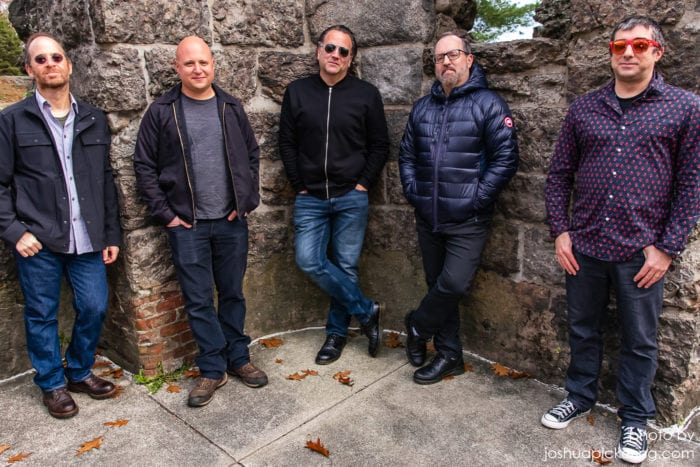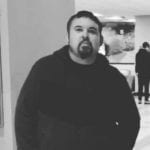
“That feels very different than Boston now, but my thoughts about the city is that Boston seems to be the scene that the Northwest grew into.”
It’s something special when a rock album gets you excited from the first riff. It leaves an impression that lasts from track to track and keeps the senses hooked until the end. That’s the feeling “Everywhere Leads The Sound” gave me right when I pressed play on Devil Love’s new Broken Things album. The quintet of vocalist and guitarist Peter Buzzelle, drummer Chuck Ferriera, lead guitarist Ken Rothman, bassist Jay Raffi, and keyboardist Josh Cohen combine to create a seriously dynamic sound. It’s a killer record that’s ideal for anyone who is looking for a mix of emphatic amplification and stellar songwriting.
I recently spoke with Buzzelle and Ferriera about turning their solo project into a full-fledged band, making the album at different studios with different producers, Buzzelle’s roots, and how COVID-19 impacted the creative process.
Before Devil Love started last year, Peter, you made a name for yourself in Boston’s local scene as a solo artist. What does the forming of the band accomplish for you that you weren’t able to capture by yourself?
Buzzelle: I’m able to collaborate more with this group. When it was just my solo efforts it was more of a singular sort of vision, which to some extent I enjoyed, but I grew tired of that artistic expression. I kind of joked that singers and guitarists will leave a band to go solo, but I’m going back to my roots and being in a band, which is how I started.
Devil Love grew out of my solo career where Chuck [Ferriera], Ken [Rothman], Jay [Raffi], and Josh [Cohen] have each been working with me on my solo stuff, Chuck in particular since he’s been drumming with me for close to 10 years. It seemed like a natural progression for all of us as we grew to become a band so with this release we decided to call the band Devil Love, which is actually the title of my last solo record.
We had a short interim period where we named ourselves Peter Buzzelle & The Academy, but we’ve called ourselves Devil Love for the past four years now while gigging and putting out a few singles.
With Broken Things, how did the making of it come about? I know you recorded it and worked with different producers around the Boston area, so was COVID-19 a big obstacle for the band to overcome?
Ferriera: I think the seeds of change actually started with the first few songs that we recorded at Revolution Sound in Charlestown with Matt Girard. We recorded three songs with him sort of as we were beginning to transition to being more of a band. I feel like it wasn’t completely written in stone yet, but maybe it was, I’m not sure. We started with just a couple songs and then we actually released one as a single, then we decided to keep pushing forward and work on a whole batch of songs. With COVID-19 getting involved in everything, we did some socially distanced tracking at Mad Oak Studios in Allston for all the drums and bass.
Everyone else was able to do different overdubs in their home studios or other locations, so we managed to stay above water I guess, if that’s the way to put it. We kind of figured it out as we went along and that’s pretty much what everyone has been doing during this whole mess.
There’s a great mix of powerpop and early ’90s alt-rock fuzz in the album that echoes Peter’s musical beginnings in the Pacific Northwest. So Peter, vital do you consider that area?
Buzzelle: That’s where I draw all of my influences basically. I’m sort of stuck in the ’90s, I came doing music as a drummer in groups out there. For me, that is still the well that I go to as an artist. The ’90s were a really special time in the Northwest and I was able to be there during that time while being highly involved and being inspired by it. All the great bands from that area were just up and comers, and my band at the time was also so it’s very inspiring for me.
I’ve been back in Boston now for close to 20 years, and I may be dating myself here but I find that Boston has now become an area for me where I’m also able to draw inspiration from. I actually see a connection where bands like the Pixies for example or the Modern Lovers, the Cars, Boston, Aerosmith, and other great bands from the Northeast have also inspired me. I see that connection and I feel it, my family has lived on both coasts and I spent time at Evergreen State College in Olympia, Washington and studied music there. That was a big influence along with the bands on Sub-Pop like Soundgarden and the bands on K Records like Sleater-Kinney. They all went to school there; I have deep roots there, but I was born in Lowell, so I was always known as the kid from Boston when I lived in the Northwest.
You kind of just alluded to it, but when it comes to the scenes you were in while in Portland and Seattle versus what’s going on in Boston right now, do you see any major contrasts or similarities between these scenes?
Buzzelle: I definitely see both. The contrasts I feel mostly comes from the Northwest being pretty focused on what it was doing. There were bands like The Posies, Sky Cries Mary, and other local acts that were all kind of in a similar place. It was definitely independent-based music where you could do anything you wanted and it really didn’t matter whether you were an expert on your instrument or not.
I remember watching some great performances, like a band called Karp for example. They were this heavy rock band that had a sound similar to the Melvins and it was very homegrown in a big scene. Portland, Olympia, Seattle, Vancouver, Idaho, and Northern California were areas that we’d tour all around in. We played shows with Mudhoney and we opened shows for Screaming Trees and also Eddie Vedder’s wife’s band. All of these people were just around. Chris Cornell came to our shows, his brother’s band would perform with us.
These were people who created good music and it exploded. I remember MTV showing up one day and they were interviewing everybody, they just wanted a piece of it. That feels very different than Boston now, but my thoughts about the city is that Boston seems to be the scene that the Northwest grew into. You had this vibe of music coming out of Boston in the ’80s and even in the ’70s with these great bands that we all love. I wasn’t here for that, so a lot of folks reference the ones that flew under the radar, but I think the Northwest was influenced by the music that came out of the Northeast.
Now in Boston, there’s an insane amount of incredibly talented musicians in all aspects of style. It’s a bigger town than Portland and Seattle, but the level of musicianship is on a level that I’ve never experienced. Not to say that the Northwest doesn’t have top musicians, but I think with the schooling that’s here with Berklee and the Conservatory it’s more varied here I would say.
What do you want people to take away from Broken Things after listening to it? Is there a certain message you’re trying to get across with the album?
Ferriera: The record really reflects where we are. … The creation of this was definitely impacted, like everyone else, by the pandemic. While it doesn’t necessarily speak to the pandemic, the interesting thing is the title is based on one of the songs off of the record and it just seemed fitting for the time that we’re in. There’s also some optimism and I think it’s for all of us as representing a microcosm of the whole struggle of what we’ve all been going through. On top of that, it’s normal life stuff that doesn’t stop because of COVID-19, so it’s a way to have something to focus on during this past year. It sort of allowed us to keep a foot in the game; we’re bummed that we can’t really play shows to support the album right now, but everybody is in the same boat so we’re trying to make the most of the situation.
We’re going to be releasing videos and looking into doing livestreams, so we could at least do something, but I think the record as a whole is reflective of the struggles in normal life while slapping the pandemic on top of it. It’s where we’re at as a band and where we all are as musicians right now.
Rob Duguay is an arts & entertainment journalist based in Providence, RI who is originally from Shelton, CT. Outside of DigBoston, he also writes for The Providence Journal, The Connecticut Examiner, The Newport Daily News, Worcester Magazine, New Noise Magazine, Northern Transmissions and numerous other publications. While covering mostly music, he has also written about film, TV, comedy, theatre, visual art, food, drink, sports and cannabis.

